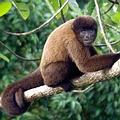 來自厄瓜多、美國和歐洲的科學在研究葉蘇尼國家公園內的各式生命形態後,19日於學術期刊上發表認為,位於厄瓜多亞馬遜核心地帶的葉蘇尼國家公園,是南美洲生物多樣性最豐富的地區。
來自厄瓜多、美國和歐洲的科學在研究葉蘇尼國家公園內的各式生命形態後,19日於學術期刊上發表認為,位於厄瓜多亞馬遜核心地帶的葉蘇尼國家公園,是南美洲生物多樣性最豐富的地區。
然而,這13名科學家提出警告,葉蘇尼地區規劃中的石油開採計畫,將可能摧毀這個世上僅存的生物多樣性豐富的荒野地區。
之前厄瓜多政府和聯合國達成一項協議,即成立30億美元的信託基金,用以補償厄瓜多停止鑽油以保護這片脆弱區域。然而這項協議已開始瓦解。
研究共同作者之一的馬里蘭大學詹金斯博士說,「南美洲的兩棲類、鳥類、哺乳類和維管束植物都在葉蘇尼這個小區域的中心達到最高的多樣性,我們將這片區域稱為「豐富度的四維中心」(quadruple richness center)。然而,這個區域只有一個嚴格的保護區,即葉蘇尼國家公園,佔地只有豐富度中心14%的地區,而使用中或規劃中的石油開採區卻占了79%。」
葉蘇尼公園內居住了列名世界自然保育聯盟(IUCN)瀕危物種紅色名錄的28種瀕危脊椎動物,包括了大型靈長類動物,如:白腹蜘蛛猴、銀絨毛猴,和水生哺乳動物,如:巨水獺和亞馬遜海牛,以及數以百計僅見於該地區的生物。
葉蘇尼公園中,平均每2.47公畝的區域就有655樹種,超過美國大陸和加拿大原生樹的總數。
著名昆蟲學家歐文(Terry Erwin)博士表示,葉蘇尼每公頃的森林大約包含10萬種昆蟲,估計是世上任何植物或動物群中,每單位面積的多樣性最高。
葉蘇尼國家公園是聯合國教科文組織的生物圈保護區及世界遺產。
該研究論文最後以科學基礎的政策建議做結,建議暫停公園內新的石油勘探或道路建設,並且在毗鄰的秘魯北部劃定禁止大規模開發的區域。
科學家們警告,開採石油無法避免重大的且不可回復的負面生態影響。特別是在對偏遠且石油含量相對豐富的葉蘇尼東北部。
厄瓜多政府一直在推動「葉蘇尼 - ITT倡議」計劃。根據此倡議,價值60億美元的900萬桶石油將不會被開採,以作為應對氣候變遷的努力。
但是,該倡議已開始瓦解。厄瓜多和聯合國發展計劃署的官員本來預期去年12月,將於哥本哈根氣候峰會時簽署信託基金的文件,但最終沒有簽署任何文件。
厄瓜多總統科雷亞於上周六的全國廣播中透露,他下令該國的談判小組拒絕簽署聯合國發展計劃的信託基金詳細的條款,因為信託基金中列有他所謂「可恥」的條件。他表示,某些國家的捐款帶有許多附加條件,而這些條件傷害厄瓜多的主權和尊嚴,因此「無法接受」。
Yasuní National Park, located in the core of the Ecuadorian Amazon, is the most biodiverse area in all of South America, a team of Ecuadorean, American, and European scientists concludes in the first major peer-reviewed study of life forms in the park, published today.
But the 13 scientists warn that proposed oil development in Yasuní threatens to destroy one of the world's last high-biodiversity wilderness areas.
An agreement between the Ecuadorian government and the United Nations for a $3 billion trust fund that would compensate Ecuador for protecting the most vulnerable area of Yasuní by leaving the oil underground has begun to unravel.
"Yasuní is at the center of a small zone where South America's amphibians, birds, mammals, and vascular plants all reach maximum diversity," said co-author Dr. Clinton Jenkins of the University of Maryland. "We dubbed this area the 'quadruple richness center.'"
"This quadruple richness center has only one viable strict protected area - Yasuní. The park covers just 14 percent of the quadruple richness center's area, whereas active or proposed oil concessions cover 79 percent,"
Yasuní contains 28 endangered vertebrates on the IUCN Red List of Threatened Species. These include large primates such as the white-bellied spider monkey and Poeppig's woolly monkey and aquatic mammals such as the giant otter and Amazonian manatee, as well as and hundreds of regional species found nowhere else on Earth.
An average upland hectare (2.47 acres) in Yasuní contains 655 tree species, more than are native to the continental United States and Canada combined.
A single hectare of forest in Yasuní is projected to contain 100,000 insect species, the highest estimated diversity per unit area in the world for any plant or animal group, says eminent entomologist Dr. Terry Erwin.
Yasuní National Park is an UNESCO Biosphere Reserve and World Heritage Site.
The paper concludes with science-based policy recommendations including a moratorium on new oil exploration or road construction within the park, and creating areas off-limits to large-scale development in adjacent northern Peru.
The scientists warn that oil can not be extracted without significant and irreversible negative ecological impacts, particularly in the remote and relatively intact oil rich northeast corner of Yasuní National Park.
The Ecuadorian government has been promoting an innovative plan, known as the Yasuní-ITT Initiative.
Under the Yasuní-ITT Initiative, 900 million barrels of oil, worth US$6 billion would not be extracted as a contribution to fighting climate change.
But this initiative has started to fall apart. Ecuadorian and UN Development Programme officials were expected to sign the trust fund documents at the UN climate summit in Copenhagen in December, but in the event nothing was signed.
President Rafael Correa revealed in his radio address to the nation on Saturday that he ordered his team in Copenhagen not to sign the detailed Terms of Reference for the UN Development Programme trust fund because of what he called the "shameful" conditions set up by the trust fund.
Correa said Saturday some countries had attached many too conditions to their donations - conditions that were "unacceptable," because they harmed Ecuador's sovereignty and dignity.
全文及圖片詳見:ENS







